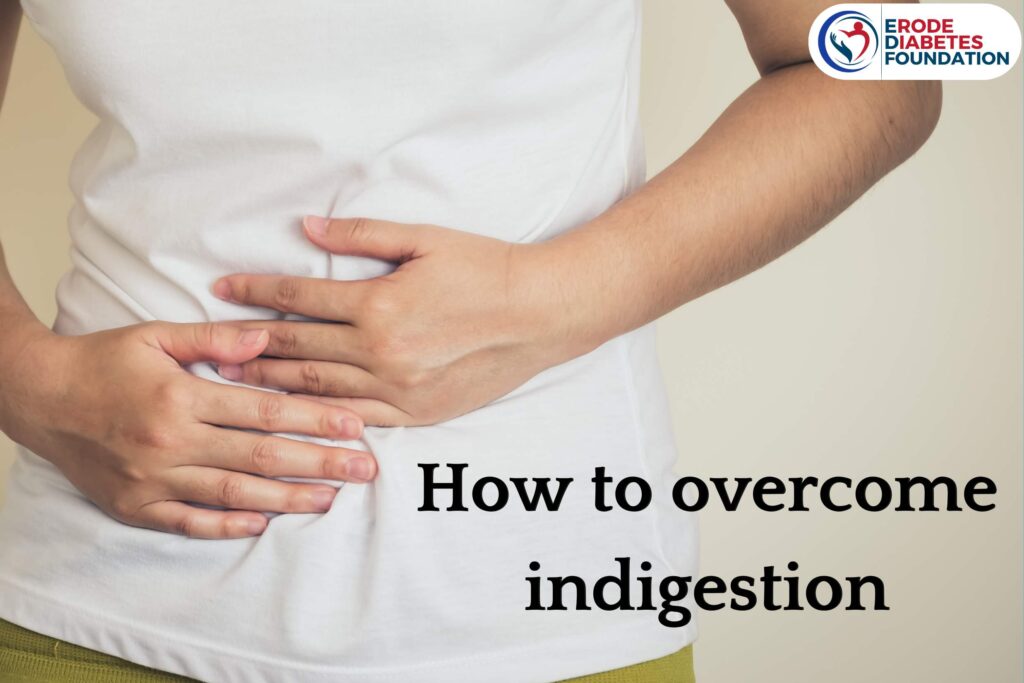Worldwide, a large number of people suffer from the prevalent condition known as diabetes. In addition to problems with the heart, kidneys, and nervous system, many diabetic patients also have gastrointestinal symptoms. Read on to learn more about how to overcome indigestion and many more in this blog

What is dyspepsia
Indigestion, or dyspepsia as it is medically termed, is pain or discomfort in the upper abdomen that usually occurs after eating or drinking. Further, medication and lifestyle changes can help to manage it.
Symptoms of dyspepsia
The symptoms of dyspepsia are
- Pain and fullness associated with the digestive system
- Feeling overly bloated and abdomen full after eating
- Heartburn
- Increased Burping
- Nausea or vomiting
- An intense burning feeling and discomfort in the stomach
Diabetes and dyspepsia
Long-standing Diabetes has the potential to cause structural changes in the vagus nerve by causing demyelination and axonal neuropathy, which regulates the passage of food through the stomach. The stomach muscles and other muscles in the digestive tract cannot work correctly (proper peristaltic forward movements)when the vagus nerve is damaged.
Therefore, food cannot pass through the digestive tract as it would normally which results in indigestion.
How to overcome indigestion
Preventing dyspepsia in elderly diabetics involves a combination of dietary, lifestyle, and medical measures. Here are some tips:
Balanced Diet
Encourage a balanced diet rich in fibre, whole grains, fruits, and vegetables. Further, avoid spicy, fried, and fatty foods that can aggravate dyspepsia.
Regular Meals
Advise regular and smaller meals throughout the day instead of large, heavy meals to prevent overeating.
Hydration
Stay well-hydrated by drinking enough water. Meanwhile, herbal teas like ginger or peppermint can also help soothe the stomach.
Avoid Trigger Foods
Identify specific trigger foods that worsen symptoms and recommend avoiding them.
Limit Caffeine and Alcohol
Reduce caffeine and alcohol consumption, as they can irritate the stomach lining.
Maintain Healthy Weight
Encourage weight management, as excess weight can increase the risk of dyspepsia.
Stress Management
Manage stress through relaxation techniques like yoga or meditation, as stress can exacerbate digestive issues.
Medication Review
Ensure diabetic medications are taken as prescribed and discuss potential side effects with their healthcare provider.
Regular Exercise
Encourage light to moderate physical activity, which can aid digestion and promote overall well-being.
Medication Consultation
If over-the-counter antacids or other medications are considered, they should consult a healthcare professional for guidance on the appropriate use.
Smoking Cessation
If applicable, advise quitting smoking, as it can contribute to dyspepsia.
Regular Check-ups
Schedule regular check-ups with a healthcare provider to monitor and manage both diabetes and digestive health.
Avoid Late-Night Eating
Discourage eating close to bedtime to reduce the risk of nighttime dyspepsia.
Chew Food Thoroughly
Encourage them to chew food slowly and thoroughly to aid digestion.
Educate on Symptoms
Make sure they are aware of the symptoms of dyspepsia and when to seek medical attention if symptoms worsen or become severe.
To sum up
Thus, this blog has given some insight into how to overcome indigestion in long-standing and elderly diabetics. Further, elderly diabetics must work closely with their healthcare providers to develop a personalized plan for managing both diabetes and digestive issues, as individual needs may vary.


